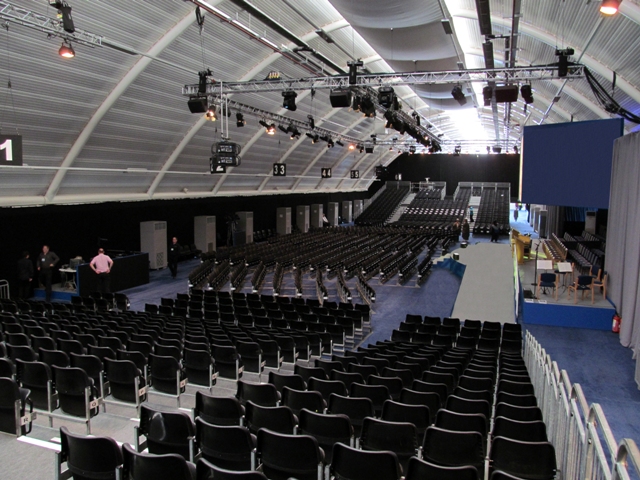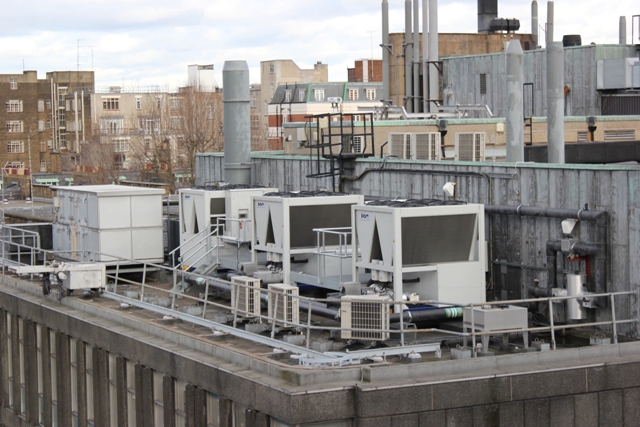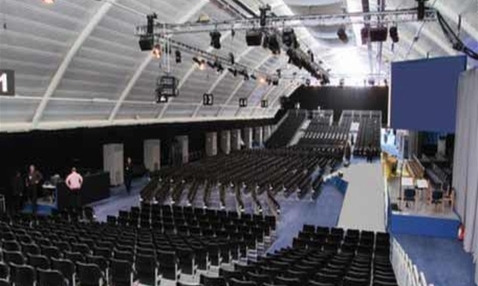Achieve improved carbon emissions and cost savings with tailored temperature solutions
Creating a green, environmentally friendly and energy-efficient learning environment with reduced carbon emissions is an increasingly important role in many buildings across the UK, especially educational institutions such as schools and universities. ICS Cool Energy’s Group Marketing Manager Stuart Wilders explains the many benefits and solutions for energy-efficient temperature control.
All departments within universities and educational facilities have the responsibility of reducing their carbon footprint to look after our environment, and with education funding directly related to carbon reduction, estates departments and faculty heads are actively encouraged to meet and exceed energy reduction targets and operational costs.
Universities consume high levels of energy and power and the number of criteria that fall within carbon reduction is vast, with many elements contributing to a facility’s energy-reduction strategy, including energy saving lighting, sustainable resources, optimal recycling and waste management, low energy state-of-the-art research and development (R&D) equipment, as well as energy efficient heating, air conditioning and air management.
Working alongside a dedicated temperature control specialist enables estates departments to harness a wealth of experience and dedicated knowledge which can lead to enhanced results, both financially and environmentally. A dedicated temperature control specialist is able to provide solutions to meet specific requirements from central campus-wide solutions, to short term events and rental options tailored to the project.
The option for either capital purchase or short term rental gives an establishment further flexibility for finance directors and estates managers, and a handful of suppliers such as ICS Cool Energy, can offer the choice.
Creating an energy conscious environment
 Temperature control is used for a variety of applications within schools and universities from creating comfortable working environments, to managing temperatures in data centres and server rooms. With technology advancing at a rapid rate, creating a comfortable environment that limits carbon use is more attainable than many educational facilities may initially realise.
Temperature control is used for a variety of applications within schools and universities from creating comfortable working environments, to managing temperatures in data centres and server rooms. With technology advancing at a rapid rate, creating a comfortable environment that limits carbon use is more attainable than many educational facilities may initially realise.
Reliable HVAC solutions combat temperature fluctuations and improve air quality and working environments for students, staff and visitors. The technology offered within these systems provides improved performance and reduced running costs which contribute towards improved energy credentials.
Air temperature and quality is at the foundation of creating a comfortable working and learning environment; unmanageable air temperatures can often stimulate fatigue, resulting in reduced concentration levels. Comfort cooling for lecture theatres, seminar rooms and communal areas can be managed through a central HVAC plant, however, cooling for data centres, server rooms and laboratory applications require more accurate, independent cooling systems that can manage precise temperatures whilst dealing with high fluctuations in thermal load conditions. Site activities such as research, development and expert training also require more specialised cooling, as do x-ray and MRI machines in university hospitals with non-ferrous systems, and laser cutting during metalwork and product development to name a few.
Regardless of the project, the environmental credentials of temperature control need to be considered at all stages of a project.
Here at ICS Cool Energy, all projects whether permanent temperature control, or temporary rental, begin with a site survey and energy analysis to identify the carbon and cost saving potential within an application. With this analysis, we then recommend a tailored solution to each site’s individual needs, layout and system configuration recommending environmental systems such as free cooling and heat recovery to achieve optimal carbon savings.
Rental solutions
Educational events and short term projects generate a need for temporary temperature control. On-site exhibitions, careers fairs, exam halls and graduation ceremonies all require increased cooling to manage short term growth in footfall.
ICS Cool Energy Ltd supplies portable air conditioning solutions, as well as cooling and heating equipment for HVAC and plant requirements, these systems are available for rental on planned and emergency projects to meet both planned seasonal events as well as contingency support to cover breakdowns or servicing downtime of central systems.
We’re regularly approached by universities for seasonal requirements where the volume of visitors is increased and improved cooling is required. We manage all applications with site space and any air flow restrictions in mind, carrying out site surveys to ensure customer expectations are met, while any site limitations are taken into consideration. These recommendations offer discrete, powerful cooling for students and staff while remaining cost effective and energy conscious. Universities and other education facilities can rent the equipment for as long as it is required; whether it’s just a day or a number of years.
Permanent process solutions
 Increased pressure on capital budgets means that the importance of remaining compliant with technological advancements and government guidelines is greater than ever. University facilities such as scientific laboratories and diagnostic equipment in university hospitals are often in regular use and the cost of running them is substantial. They contribute greatly towards the university’s energy bill and by implementing greener technology to facilitate the cooling of such systems helps to achieve improved energy credentials and reduced operating costs.
Increased pressure on capital budgets means that the importance of remaining compliant with technological advancements and government guidelines is greater than ever. University facilities such as scientific laboratories and diagnostic equipment in university hospitals are often in regular use and the cost of running them is substantial. They contribute greatly towards the university’s energy bill and by implementing greener technology to facilitate the cooling of such systems helps to achieve improved energy credentials and reduced operating costs.
Air source, water source and geothermal/ground source heat pumps are capable of providing powerful cooling and heating simultaneously, providing comfortable conditions and reduced carbon emissions of up to 55%.
Heat pumps offer a modern, low carbon temperature control solution for new builds and refurbishments, and can help a site achieve BREEAM (Building Research Establishment Environmental Assessment Method) points.
We have built a strong relationship with many educational institutions and have managed to achieve a wide range of energy saving credentials for universities, schools and colleges throughout the UK.
We recently assisted a college in the north of the UK with a refurbishment project which included four air source units to allow the facility to achieve high COP (coefficient of performance) levels of 4.02; a typical electrical heater operates at 1.0. Our units offer various energy saving features including inverter driven compressors which provide small start-up currents for sites where electrical supply is an issue, and weather sensors to take advantage of solar gains and accurate ambient air temperature readings.
ICS Cool Energy also undertook a project supporting a new block of student accommodation in a London university using our air source heat pump technology. It’s an extremely efficient means of cost effectively providing heating, cooling and domestic hot water to a site.
Heat pump technology is highly adaptable as a central system or a modular zoned approach which can be applied to the design of the installation to meet the requirements of any size of application. Using a combination of electrical power alongside the thermal properties from the ambient air the University has reduced their energy consumption, while providing under floor heating to student apartments.
ICS’s Service department can further support the range of equipment, ensuring reliable continuous operational support, 24/7, 365 days a year.
Feature Case Study: Cooling for University Chemical Lab
Ranked fourth in the world’s top ten universities (World University Rankings 2011) and with over 26,000 students, University College London is one the UK’s largest and oldest universities. Amongst the university’s estate is the Christopher Ingold building, a chemistry auditorium, located south of Euston station. Christopher Ingold, the British Chemist, responsible for the introduction of mainstream chemistry concepts opened the building himself in 1968, which was later voted second in London’s ‘Best Building of 1970’. The building contains a number of laboratories used for chemical sciences, requiring temperature controlled environments which are managed by cooling equipment located on the rooftop. When the building’s old cooling system began to fail, energy costs increased and the requirement for a new cooling system was put out to tender…
Three air cooled chillers located on the roof of the building provide chilled water to the laboratories for laser equipment as well as comfort cooling for personnel. The lasers require constant cooling due to the significant amount of heat generated. This heat must be removed from the laser system in order to avoid the overheating of vital components and potentially causing a negative impact on critically controlled experiments. Temperatures can be set to maintain stability; ensuring the laser system is operating at the optimal wavelength for maximum efficiency. These chillers feature advanced refrigeration circuits to ensure they maintain the rigid temperature stability required for a laser system’s pointing stability and beam quality.
Not only did a new cooling system need to uphold the necessary controlled environments within the building, it also had to meet the university’s requirements for energy efficiency. ICS Cool Energy recommended a bespoke cooling solution designed specifically to maximise energy usage. Three multi-scroll 143kW air cooled chillers were supplied and sited on the building’s rooftop. Multi-scroll units can achieve better part-load efficiencies when comparing them to screw compressor units. Furthermore, they offer a lightweight solution for the site and permit the elimination of the storage tank with the associated dispersal of cooling energy.
ICS Cool Energy provided the university with a complete energy analysis for the new installation, calculating an energy saving of 20% per annum, based on the ESEER (European Seasonal Energy Efficiency Ratio) of the chillers.
One of the requirements of the new chiller system was to minimise noise outputs; thereby reducing potential distribution to working practices within the labs. The progressive stopping of the compressors and fans within the units mean that they are extremely quiet in operation; rendering them ideal for installation in noise-sensitive surroundings.
Working for UCL’s estates department, Novica Jevric, Special Projects Engineer, commented on the cooling system ICS provided for the site:
‘ICS Cool Energy provided a professional proposal which worked well within our budget and the cooling system which they supplied maintains efficient and consistent temperatures for our laboratories within the Christopher Ingold building.’


